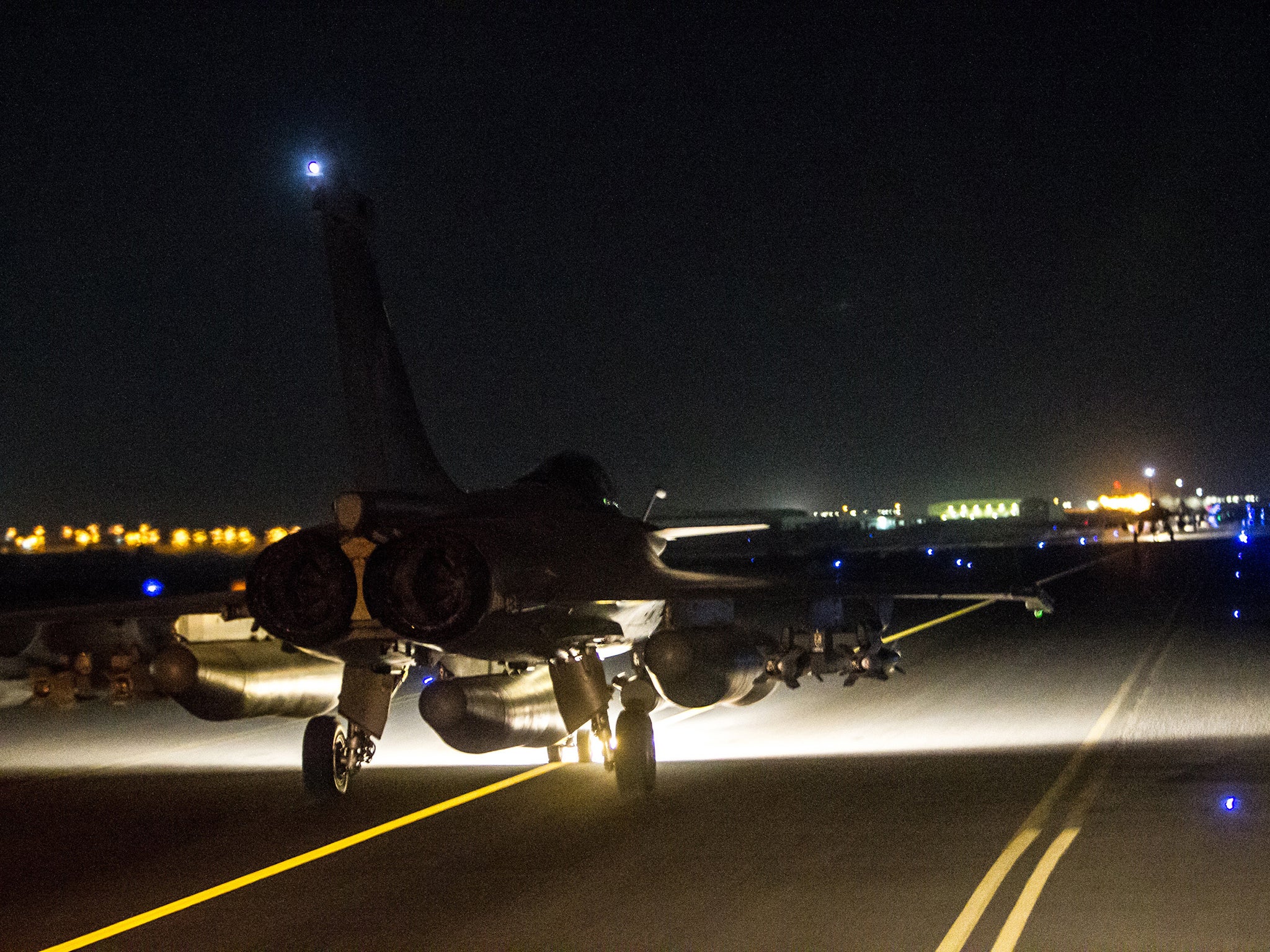Paris terror: Air strikes will have little effect if they are the only weapon in the war against Isis
Air power only has a decisive impact when reinforced with close co-operation with a reliable military ally on the ground


Your support helps us to tell the story
From reproductive rights to climate change to Big Tech, The Independent is on the ground when the story is developing. Whether it's investigating the financials of Elon Musk's pro-Trump PAC or producing our latest documentary, 'The A Word', which shines a light on the American women fighting for reproductive rights, we know how important it is to parse out the facts from the messaging.
At such a critical moment in US history, we need reporters on the ground. Your donation allows us to keep sending journalists to speak to both sides of the story.
The Independent is trusted by Americans across the entire political spectrum. And unlike many other quality news outlets, we choose not to lock Americans out of our reporting and analysis with paywalls. We believe quality journalism should be available to everyone, paid for by those who can afford it.
Your support makes all the difference.French aircraft have bombed Raqqa, Isis’s capital, and hit an Isis training camp and a suspected arms depot according to a local monitoring group. But ten French planes dropping 20 bombs are unlikely to achieve very much because targets are concealed, dispersed and difficult to detect.
The limitations on the effectiveness of French military actions are made clear by the failure of the much larger US-led air campaign to contain Isis since air strikes began in August last year. It has caused damage and inflicted casualties on Isis and, on occasion, has led to their defeat in ground battles with the Syrian and Iraqi Kurds. But, despite being vulnerable to air attack, Isis was still able to capture Palmyra in Syria and Ramadi in Iraq in May.
The air campaign is very much dominated by the US, particularly in Syria. As of 6 October this year, the US and its allies had conducted 57,843 sorties in support of operations in Iraq and Syria, but these had led to only 7,323 air strikes according to the US Defence Department. Even allowing for refuelling and reconnaissance missions, this means the great majority of sorties did not find a target and returned without using their bombs and missiles.
They do not find targets because Isis is essentially a guerrilla organisation. It has dispersed its men and equipment or kept them in mosques, schools and hospitals that the US and its allies would find embarrassing to destroy. The US and British clearly do have informants on the ground in Raqqa enabling them to find and kill Mohammed Emwazi, so-called “Jihadi John”, last week.
But Isis has a proactive and ruthless intelligence service and in cities like Mosul it has blown up mobile phone towers to prevent people communicating with the outside world. It puts greater effort into protecting its military and political leaders than it would into safeguarding Emwazi, who was a simple executioner whatever his notoriety in Britain and the US. These leaders will be difficult to identify for people in Raqqa or elsewhere in Islamic State. Isis fighters say they do not know people above them in their military hierarchy aside from their own immediate commander.
The air strikes limit Isis’s military options and, in certain circumstances, cause heavy losses, the best example being the siege of Kobani over four-and-a-half months. This came close to falling to Isis in October 2014 despite heroic resistance by Syrian Kurdish fighters of the People’s Protection Units (YPG), but it was saved by massive US air strikes. These eventually numbered over 700 and may have killed as many as 2,000 Isis fighters who were located in a small and easily targeted space. The YPG was able to provide precise co-ordinates for enemy positions to the operations base in Erbil, the capital of the Kurdistan Regional Government.
Air strikes only have a decisive impact when they are launched in close co-operation with a reliable military ally on the ground. The 50 Russian planes similarly get some 400 to 800 co-ordinates a day from the Syrian army. This appears to have been effective in enabling the Syrian army with Russian support to advance south and east of Aleppo, breaking Isis’s long siege of Kweiris air base and giving the Syrian army its greatest success for two years.
The great majority of the air strikes by the US-led coalition have been carried out by the US air force. Out of 8,125 air strikes up to 12 November, the US carried out 6,353, while, of those carried out by its allies, just 146 were in Syria. The contribution of Arab forces has fallen to almost nothing, as the states use their air power to attack Yemen. Turkey, committed to attacking Isis since July when it finally let the US use its Incirlik airbase, has largely confined itself to bombing the Kurdistan Workers Party (PKK) in south east Turkey and northern Iraq.
Isis may have to defend Raqqa and, sometime later, Mosul from ground assault backed by massive air raids. Its commanders are reportedly divided as to whether they want to take the heavy losses involved in fighting from fixed positions in cities. Their military strength lies in fluid guerrilla type battles when they launch many diversionary assaults before the main attack and thereby achieve an element of surprise. Hostile air power puts pressure on them, but will not necessarily defeat them.
Join our commenting forum
Join thought-provoking conversations, follow other Independent readers and see their replies
Comments